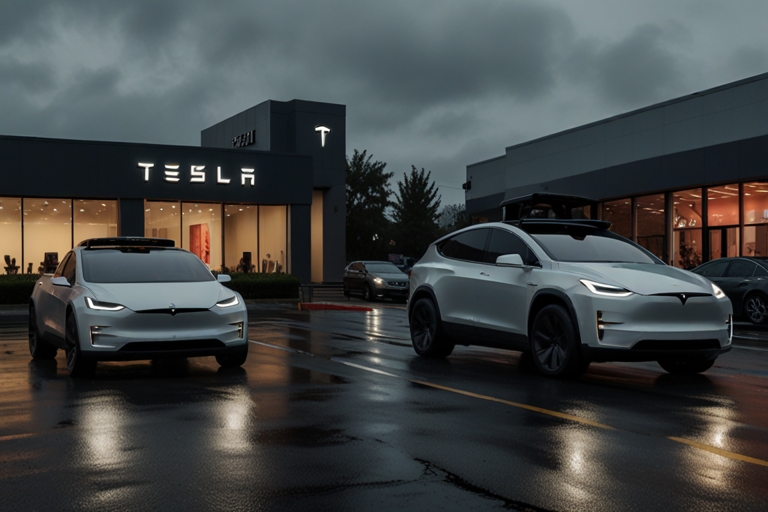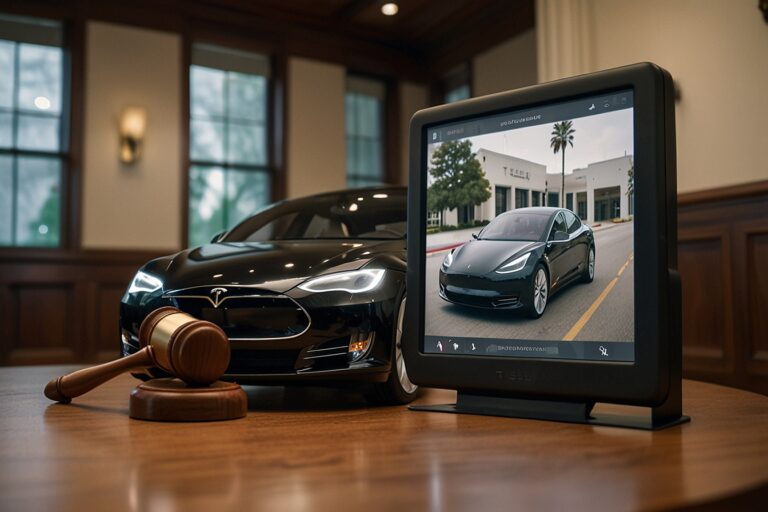
TL;DR
- Tesla faces its two largest sales declines ever amid growing competition and loss of key federal incentives
- Elon Musk’s increasing political involvement is causing investor concern during a crucial growth phase
- Removal of the $7,500 electric vehicle tax credit and elimination of emissions fines threaten Tesla’s lucrative regulatory credit revenue
- Tesla’s autonomous robotaxi rollout lags behind competitors like Waymo, limiting future growth prospects
- Chinese automaker BYD is set to surpass Tesla in global EV sales this year, signaling Tesla’s shrinking market share
Tesla’s Political Drama Distracts From Core Business Challenges
While recent headlines have focused on Elon Musk’s public clash with former President Donald Trump and his announcement to launch a new political party, Tesla’s financial outlook is worsening independently of these controversies.
Tesla’s stock price dropped 6.8% on Monday amid investor worries over Musk’s political distractions, though it rebounded slightly on Tuesday.
Wedbush Securities analyst Dan Ives urged the Tesla board to impose limits on Musk’s political activities to refocus on the company’s critical phase in autonomous vehicle and robotics development.
Regulatory Credit Revenue Is Disappearing
Tesla’s profits have long been bolstered by selling regulatory credits to other automakers who fail to meet emissions targets. Since 2019, these credits have contributed over $10 billion in revenue.
However, a recent tax and spending bill signed by Trump eliminated both the $7,500 federal electric vehicle tax credit for buyers and the penalties that created demand for Tesla’s credits. Analysts at William Blair warn this loss will significantly impact Tesla’s bottom line, pushing the company toward losses again.
Tesla’s Robotaxi Rollout Trails Competitors
Musk’s vision for a self-driving robotaxi fleet remains limited to Austin, Texas, with safety drivers monitoring vehicles, while competitors like Waymo have expanded service to multiple cities and plan to launch in Miami and Washington, DC, soon.
Incidents like robotaxis driving on the wrong side of the road and nearly colliding with parked cars have further dampened enthusiasm for Tesla’s autonomous efforts.
Intensifying Market Competition and Sales Decline
Tesla’s global sales declined a record 13% in both the first and second quarters of 2025 despite overall growth in the EV market, reflecting lost market share amid fierce competition.
Chinese automaker BYD is on track to surpass Tesla’s global EV sales for the first time, fueled by aggressive market expansion and product offerings.
The Upcoming Expiration of EV Tax Credits Could Deepen Trouble
The $7,500 federal tax credit for electric vehicle buyers is set to expire on October 1, 2025, further weakening demand for Tesla’s vehicles. Tesla previously slashed prices to compensate when credits phased out in 2019.
Musk’s recent social media posts, such as urging consumers to “yolo your car purchase,” highlight the urgency but also hint at uncertain market dynamics ahead.
Backlash From Musk’s Political Engagement Adds to Sales Pressure
Musk’s polarizing political actions have sparked protests outside Tesla showrooms across North America and Europe, damaging the company’s brand.
Even former ally Trump’s public endorsements have failed to counterbalance the broad political backlash Tesla faces, with some analysts noting Musk has alienated supporters on all sides.
The Data
| Metric | Details |
| Tesla’s Sales Decline (Q1 & Q2 2025) | Record 13% drop year-over-year |
| Federal EV Tax Credit | $7,500, expiring Oct 1, 2025 |
| Regulatory Credit Revenue | $10.6 billion since 2019, now eliminated |
| Key Competitors | BYD, Waymo |
| Autonomous Vehicle Service | Tesla’s robotaxi limited to Austin; Waymo in 4 cities |
| Analyst Recommendations | Wedbush: maintain buy but urge board oversight; William Blair: downgrade to neutral |






